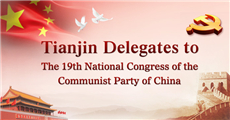Winter is the high time for air pollution in Beijing, Tianjin, and Hebei. In order to effectively control air quality, Tianjin published a detailed plan to manage air pollution from October 15 to March 31 next year.
The plan is based on the existing measures and enhances management in 21 aspects such as coal firing, dust, tail gas emissions, and industrial pollution.
Wang Wenmei, senior engineer of the city’s environmental protection bureau said that the increasing use of coal during winter time will lead to growth in total emissions from coal. Natural factors such as desiccation and lack of wind will contribute to the collection of dust and will finally lead to heavy air pollution in winter, said Wang.
Furthermore, winter is the time to burn grass, waste, and straw, and a traditional time for fireworks. These factors will influence the air quality, added Wang.
Targeting the seasonal air pollution, the plan urges the acceleration of reconstruction of coal furnaces, control of coal firing, and management of dust and slag at construction sites.
The city will launch a three-month enforcement targeting institutions that break the rules of air pollution. Yang Yong, director of the air pollution management office, said that the action will focus on monitoring emissions from coal firing facilities, manufacturers, and construction sites. Institutions breaking the rules will be punished according to the law.

 Daily life
Daily life




